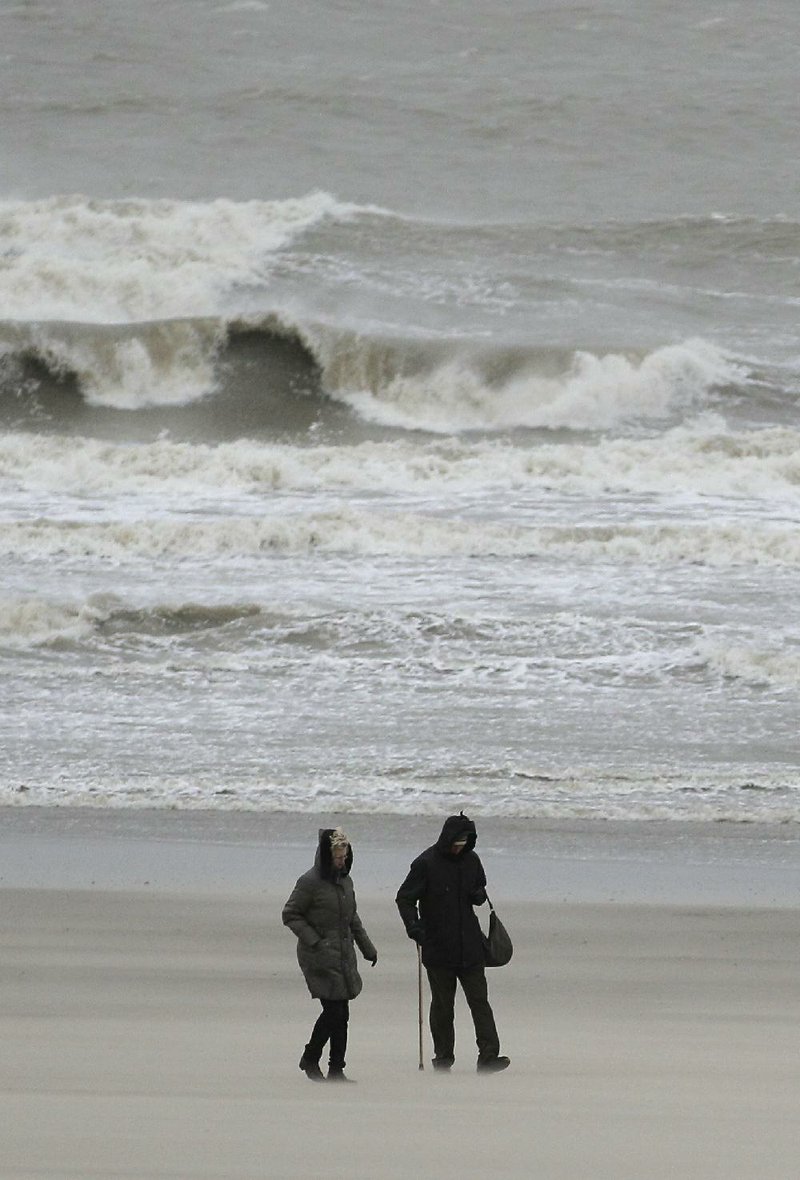LONDON - Hurricane-force gusts hit Britain on Thursday, halting trains, disrupting air travel and leaving tens of thousands of homes without electricity. Accidents linked to the storm killed two people.
Authorities evacuated about 10,000 homes along the eastern English coast after warning that the country could face its worst tidal surge in 60 years. The Thames Barrier - a series of huge metal plates that can be raised across the entire river - was being closed Thursday to protect London from the surge.
Rescue teams had to ferry residents to safety by boat in north Wales, while officials in other areas handed out sandbags and set up emergency shelters.
Transport troubles were reported throughout northwestern Europe as commuters raced home to ride out the storm.
Tidal floods - caused as the storm drives huge amounts of seawater toward the land - were expected in Britain, Germany and Scandinavia, together with freezing high winds from Greenland.
Some schools in the northern Netherlands closed early so children could get home safely to celebrate Sinterklaas - the traditional Dutch version of Christmas - with their families, national broadcaster NOS reported. In Denmark, the nation’s largest department store, Magasin du Nord, closed three hours early so employees could get home.
The German Weather Service said the storm front, which was gathering strength as it headed eastward from the Atlantic Ocean off Greenland, would also carry polar air to Europe. Snow was expected in some low-lying areas.
The storm plowed into Scotland overnight, slamming the highlands with gusts up to 142 mph.
Train services were suspended for much of the day but began to run later as some routes were cleared of debris.
Passengers on an easyJet flight from London to Glasgow, Scotland, wound up landing in Manchester after aborted attempts to land in both Glasgow and Edinburgh. As the plane neared Scotland, “suddenly everything started shaking and bumping, we were going up and down, up and down,” passenger Hazel Bedford said.
“An awful lot of people were being sick but the plane, it was incredibly quiet. When cabin crew said ‘We’re going to Manchester,’ people started to realize this was serious,” she said.
An accident west of Edinburgh claimed the life of a truck driver, and a falling tree killed a man in Nottinghamshire.
Police in western Denmark said a 72-year-old woman died when the van she was in was knocked over in the storm.
Other corners of Europe braced for the worst. Forecasters predicted winds gusting up to 87 mph along Germany’s North Sea coast.
Ferry operators canceled services to some of Germany’s North Sea islands, and the country’s national railway, Deutsche Bahn, warned of likely disruptions across a swath of northern Germany.
German authorities reported flooding on the tiny low-lying North Sea islands of Langeness and Hooge near Denmark, the DPA news agency reported. Residents protected their homes with sandbags and other barriers against the rising waters, but none of the houses - all built on raised foundations - was thought to be in immediate danger.
Still, Langeness Mayor Heike Hinrichsen warned if the seas rose as high as predicted, the “waves of the North Sea will be lapping at the houses.”
“Nobody on the islands will be closing their eyes tonight,” Langeness resident Fiede Nissen said. “It’s already tense.”
Almost all flights to and from Hamburg airport in northern Germany were canceled late Thursday.
The Netherlands braced for the storm by closing water barriers that protect the low-lying country from high tides.
The Oosterscheldekering in the southwestern delta region was being closed to protect the land behind it for the first time since 2007.
Water authorities in the northern Dutch province of Friesland said they would patrol dikes in the evening to make sure any breaches or damages from the high tides are quickly repaired.
Dikes there are built to withstand water levels of nearly 16 1/2 feet above normal. Thursday’s tide was predicted to be around 10 feet higher than normal, the authority said
National Dutch carrier KLM canceled dozens of flights to European airports as a precaution.
Danish and Norwegian police urged people to stay indoors.
Information for this article was contributed by David Rising, Frank Jordans, Robert Barr, Jan M. Olsen and Mike Corder of The Associated Press.
Front Section, Pages 2 on 12/06/2013
